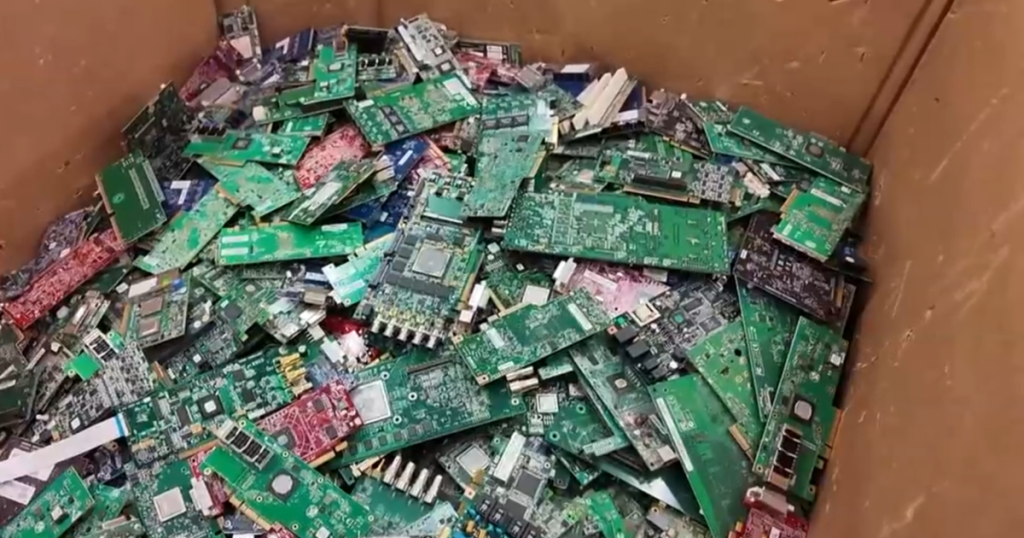In Freeport, New York, eWorks is redefining the process of electronic waste recycling. With piles of discarded televisions, personal computers, and printers, the organization is on a mission to extract valuable resources from what many consider junk. Under the leadership of CEO Mark Wilkins, the team combines innovative techniques and social responsibility, employing individuals with disabilities to tackle the growing e-waste crisis.
| Article Subheadings |
|---|
| 1) The Growing E-Waste Problem |
| 2) Innovative Gold Extraction Methods |
| 3) eWorks’ Commitment to Employment |
| 4) Environmental Implications of E-Waste |
| 5) Future Directions for E-Waste Recycling |
The Growing E-Waste Problem
According to a recent United Nations report, the global production of electronic waste reached a staggering 62 million tons in 2022, representing an 82% increase from just a decade prior. This troubling trend indicates that societal reliance on technology continues to rise, with items like outdated cellphones and laptops contributing significantly to this growing crisis. As technology rapidly evolves, many devices quickly fall out of favor, leading to an accumulation of discarded electronics.
The rising e-waste figures are alarming, especially when considering that by 2030, experts predict this volume could surge to 80 million metric tons annually. The components within these devices, including precious metals like gold, raise both environmental and financial concerns. How to responsibly manage e-waste remains a pressing question for societies around the globe.
Innovative Gold Extraction Methods
In light of the escalating amounts of e-waste, innovative solutions to recover valuable resources have become increasingly critical. Research conducted by Alireza Abbaspourrad, an associate professor at Cornell University, demonstrates that electronic waste contains more gold than traditional ore mines. For instance, one million used cellphones can yield approximately 70 to 85 pounds of gold.
Traditionally, extracting gold from electronics has necessitated harmful chemicals, like cyanide, which pose environmental risks. However, Abbaspourrad and his team have developed a groundbreaking method that utilizes an organic compound akin to a sponge, which selectively absorbs gold ions, providing a more eco-friendly alternative. This innovative approach can facilitate the recycling of gold, making it feasible to reuse in solar panels, electronics, and even pieces of jewelry.
eWorks’ Commitment to Employment
As a part of this e-waste recovery mission, eWorks serves a dual purpose: they aim to address the e-waste crisis while also providing opportunities for employment to individuals with disabilities. Founded over a decade ago, eWorks has created numerous jobs within the community, embodying a mission to empower marginalized individuals through training and education.
Approximately 48% of eWorks’ workforce are individuals with special needs. Mark Wilkins, the CEO, highlights that the organization is dedicated to creating a constructive work environment. He states,
“Our mission is to provide training, education, and employment for people with disabilities.”
This model not only benefits employees but also contributes to a sustainable approach to electronic waste management.
Environmental Implications of E-Waste
The environmental challenges posed by e-waste are substantial. Discarded electronics often contain toxic substances such as lead, mercury, and cadmium, which can leach into soil and groundwater if disposed of improperly. This pollution poses health risks to communities and wildlife. Therefore, effective e-waste management and responsible recycling processes are crucial.
Wilkins emphasizes the growing awareness of these issues, noting,
“I think the world right now is much more aware of it.”
The innovative extraction methods being developed, along with community efforts like those at eWorks, can play a significant role in reducing the environmental burden associated with electronic waste.
Future Directions for E-Waste Recycling
Looking ahead, the future of e-waste recycling appears promising yet challenging. As technology continues to advance at a rapid pace, devising effective and safe methods to recycle and recover valuable materials will be essential. Numerous companies and research institutions are investigating new techniques that not only minimize environmental impact but also make recycling financially viable.
The ongoing work at eWorks and partnerships with academic institutions like Cornell represent a step towards improved practices. The possibility of broader implementation of eco-friendly methods could increase public interest and participation in recycling initiatives, thus addressing both the environmental impact and the financial incentives for responsible disposal.
| No. | Key Points |
|---|---|
| 1 | eWorks in Freeport, New York is focused on recycling electronic waste. |
| 2 | Innovative research is finding ways to extract useful materials like gold from discarded electronics. |
| 3 | A significant portion of eWorks’ workforce consists of people with disabilities. |
| 4 | Environmental concerns regarding toxic substances in e-waste are increasingly recognized. |
| 5 | Future advancements in recycling technologies are essential to manage growing e-waste. |
Summary
The burgeoning crisis of electronic waste serves as a call to action, urging innovators, organizations, and policymakers alike to rethink traditional recycling methods. Efforts from eWorks and other pioneers in the industry showcase the potential for sustainable recycling techniques that not only recover valuable materials but also provide meaningful employment opportunities. As awareness grows, the collective push toward effective e-waste management will be instrumental in shaping a more sustainable future.
Frequently Asked Questions
Question: Why is electronic waste a growing problem?
Electronic waste is a growing problem due to rapid advancements in technology, leading to increased obsolescence of gadgets and devices. The accumulation of outdated electronics poses significant environmental and health risks if not disposed of properly.
Question: How much gold can be recovered from e-waste?
Research indicates that approximately one million used cell phones can yield around 70 to 85 pounds of gold, highlighting the economic potential of recycling electronic waste.
Question: What steps are being taken to improve e-waste recycling?
Innovative methods, such as using organic compounds to extract gold without harmful chemicals, are being developed. Additionally, organizations like eWorks focus on creating job opportunities for individuals with disabilities while addressing the e-waste challenge.


